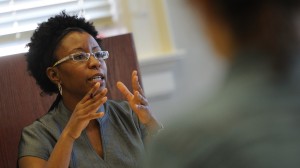OXFORD, Miss. – Archaeology doesn’t just mean digging in the dirt; it also means examining the cultural history, something in which Jodi Skipper is immersed.
Skipper, an assistant professor of anthropology and Southern studies at the University of Mississippi, explores the intersections of public archaeology and cultural heritage tourism. Her specialties include historic archaeology and other forms of cultural resource management, African diaspora anthropology, museum and heritage studies, and the politics of cultural representations.
She is a collaborator with the African Scientific Research Institute, or ASRI, in preparation for the 2013 African Diaspora Heritage Trail conference, an international cultural tourism initiative that promotes socially conscious travel to sites identified as relevant and important to the global narrative of people and culture of African descent. The ADHT Foundation seeks to establish heritage trails linking diaspora traditions in Africa, Europe and the Western Hemisphere by developing a network of collaborators who identify, build, finance, promote and market cultural heritage destinations.
Skipper began by talking with David Palmer, an archeologist at the University of Louisiana at Lafayette, which is in her hometown. He told her that ASRI had come down from Chicago to conduct research about a slave cemetery in Parks, La.
“That rang a bell for me because my paternal grandmother is from Parks,” Skipper said. “I called Jihad Muhammad, the man who founded ASRI, and he told me that he had just interviewed my great aunt, so I realized my family was embedded in this project.”
Muhammed is a medical illustrator, and he ultimately wanted to resurrect or reconstruct images of former enslaved Africans by looking at the human remains, specifically, their faces.
“That is not something that I as an archaeologist traditionally do, but that’s the project that he initially proposed to the community,” said Skipper, who worked as an unofficial consultant to begin a narrative about economic development and how the cemetery site could bring visitors to the area. “This project is a collaborative effort between the ASRI folks, local members of the community, tourism officials in St. Martin Parish and members of the University of Louisiana at Lafayette community.”
The annual ADHT conference, which is planned for October 2013 in Lafayette, creates a unique and inspiring learning environment for those committed to the development of African diaspora heritage destinations. One of the proposed trail sites is Promiseland, a small village in St. Martin Parish along the Bayou Teche. The ADHT’s goal to tap into “the growing cultural heritage market” aligns with Skipper’s effort to examine the history and development of Promiseland.
Skipper hopes members of the community will start to think through how some of these broader international issues relate to them.
“I know they have a sense of an African diaspora and what that means, but I don’t think they have a wide-ranging sense of how these connections can be interesting to people, especially tourists,” she said.
Another research project close to her roots is an examination of Mardi Gras celebrations to help document local forms of expressive culture and to better understand how south-central Louisiana communities create and reinforce their African diasporic identities.
Skipper and David Wharton, UM director of documentary studies and assistant professor of Southern studies, traveled to Lafayette and St. Martinville, La.
“I made contact with the Lafayette Mardi Gras Festival Association, which is the oldest historically black Mardi Gras association there, and we documented the processes of their children’s pageant and adult ball, held in the Heymann Performing Arts Center,” Skipper said.
Each year, the theme surrounds King Toussaint and Queen Suzanne.
“When I was told about their king and queen, that’s when I started to think about this large African diaspora connection, because they are the famous Haitian revolutionary couple,” Skipper said. “I started to think through and wonder why they would specifically choose those two.”
Wharton and Skipper also documented a community service parade at a local nursing home and had the privilege of riding on a float in the Lafayette parade.
“On a larger scale, I started to think about how specifically not just the rural Mardi Gras, but how Mardi Gras in general could complement a lot of what we were thinking through in terms of tourism,” Skipper said. “So not necessarily thinking through economic development, because I don’t necessarily think there is a need for more people to come to the parades, but for people to know they exist and also for them to know what the African diaspora heritage connections are to those specific parades. And there are several, if you think through some of the traditions and see how they historically relate to things that were going on in Haiti at the same time.”
